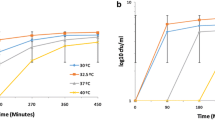Abstract
The study of the effect of malonate (an inhibitor of the succinate dehydrogenase complex of the respiratory chain of mitochondria) on the thermotolerance of the fermentative Saccharomyces cerevisiae and nonfermentative Rhodotorula rubra yeasts showed that malonate augmented the damaging effect of heat shock on the yeasts utilizing glucose (or other sugars) by means of oxidative phosphorylation. At the same time, malonate did not influence, and sometimes even improved, the thermotolerance of the yeasts utilizing glucose through fermentation. The suggestion is made that cell tolerance to heat shock depends on the normal functioning of mitochondria. On the other hand, their increased activity at elevated temperatures may accelerate the formation of cytotoxic reactive oxygen species and, hence, is not beneficial to cells.
Similar content being viewed by others
REFERENCES
Kappeli, O., Regulation of Carbon Metabolism in Saccharomyces cerevisiae and Related Yeasts, Adv. Microb. Physiol., 1986, vol. 28, pp. 181-209.
De Deken, R.H., The Crabtree Effect: A Regulatory System in Yeast, J. Gen. Microbiol., 1966, vol. 44,no. 2, pp. 149-156.
Kreger van Rij, N.J.W., Debaryomyces Lodder et Kreger-van Rij nom. conserv., The Yeast: A Taxonomic Study, Lodder, J., Ed., Amsterdam: North-Holland Publ., 1970, pp. 129-156.
Phaff, H.J. and Ahearn, D.G., Rhodotorula Harrison, The Yeast: A Taxonomic Study, Lodder, J., Ed., Amsterdam: North-Holland Publ., 1970, pp. 1187-1223.
Rikhvanov, E.G., Varakina, N.N., Rusaleva, T.M., Rachenko, E.I., and Voinikov, V.K., The Effect of the Cytochrome Oxidase Inhibitors on the Thermotolerance of Yeasts, Mikrobiologiya, 2003, vol. 72,no. 2, pp. 174-179.
Rikhvanov, E.G., Varakina, N.N., Rusaleva, T.M., Rachenko, E.I., and Voinikov, V.K., The Effect of Sodium Azide on the Thermotolerance of the Yeasts Saccharomyces cerevisiae and Candida albicans, Mikrobiologiya, 2002, vol. 71,no. 6, pp. 768-772.
Davidson, J.F., Whyte, B., Bissinger, P.H., and Schiestl, R.H., Oxidative Stress Is Involved in Heat-Induced Cell Death in Saccharomyces cerevisiae, Proc. Natl. Acad. Sci. USA, 1996, vol. 93,no. 10, pp. 5116-5121.
Sugiyama, K., Izawa, S., and Inoue, Y., The Yap1p-Dependent Induction of Glutathione Synthesis in Heat Shock Response of Saccharomyces cerevisiae, J. Biol. Chem., 2000, vol. 275,no. 20, pp. 15535-15540.
Slater, E.C., Application of Inhibitors and Uncouplers for a Study of Oxidative Phosphorylation, Methods Enzymol., 1967, vol. 10, pp. 48-57.
Joseph-Horne, T., Hollomon, D.W., and Wood, P.M., Fungal Respiration: A Fusion of Standard and Alternative Components, Biochim. Biophys. Acta, 2001, vol. 1504,no. 2/3, pp. 179-195.
Parsell, D.A. and Lindquist, S., The Function of Heat-Shock Proteins in Stress Tolerance: Degradation and Reactivation of Damaged Proteins, Annu. Rev. Genet., 1993, vol. 27, pp. 437-496.
Nguyen, V.T. and Bensaude, O., Increased Thermal Aggregation of Proteins in ATP-depleted Mammalian Cells, Eur. J. Biochem., 1994, vol. 220,no. 1, pp. 239-246.
Mitchel, R.E. and Morrison, D.P., Assessment of the Role of Oxygen and Mitochondria in Heat Shock Induction of Radiation and Thermal Resistance in Saccharomyces cerevisiae, Radiat. Res., 1983, vol. 96,no. 1, pp. 113-117.
Weitzel, G., Pilatus, U., and Rensing, L., The Cytoplasmic pH, ATP Content, and Total Protein Synthesis Rate during Heat-Shock Protein Inducing Treatments in Yeast, Exp. Cell Res., 1987, vol. 170,no. 1, pp. 64-79.
Pozmogova, I.N., The Effect of Submaximal Temperatures on Thermotolerant Yeasts, Mikrobiologiya, 1976, vol. 45, pp. 97-99.
Patriarca, E.J. and Maresca, B., Acquired Thermotolerance Following Heat Shock Protein Synthesis Prevents Impairment of Mitochondrial ATPase Activity at Elevated Temperatures in Saccharomyces cerevisiae, Exp. Cell Res., 1990, vol. 190,no. 1, pp. 57-64.
Rikhvanov, E.G., Varakina, N.N., Rusaleva, T.M., Rachenko, E.I., Kiseleva, V.A., and Voinikov, V.K., Heat Shock-induced Changes in the Respiration of the Yeast Saccharomyces cerevisiae, Mikrobiologiya, 2001, vol. 70,no. 4, pp. 531-535.
Korshunov, S.S., Skulachev, V.P., and Starkov, A.A., High Protonic Potential Actuates a Mechanism of Production of Reactive Oxygen Species in Mitochondria, FEBS Lett., 1997, vol. 416,no. 1, pp. 15-18.
van Uden, N., Temperature Profiles of Yeasts, Adv. Microb. Physiol., 1984, vol. 25, pp. 195-251.
Schenberg-Frascino, A. and Moustacchi, E., Lethal and Mutagenic Effects of Elevated Temperature on Haploid Yeast: I. Variations in Sensitivity during the Cell Cycle, Mol. Gen. Genet., 1972, vol. 115,no. 3, pp. 243-257.
Hanninen, A.-L., Simola, M., Saris, N., and Makarow, M., The Cytoplasmic Chaperone Hsp104 Is Required for Conformational Repair of Heat-denatured Proteins in the Yeast Endoplasmic Reticulum, Mol. Cell. Biol., 1999, vol. 10,no. 11, pp. 3623-3632.
Sozinov, D.Yu., Rikhvanov, E.G., Varakina, N.N., Rachenko, E.I., and Voinikov, V.K., The Effect of the Postshock Temperature on the Survival of Debaryomyces vanriji, Fiziol. Rast. (Moscow), 1999, vol. 46,no. 2, pp. 276-281.
Author information
Authors and Affiliations
Rights and permissions
About this article
Cite this article
Rikhvanov, E.G., Varakina, N.N., Rusaleva, T.M. et al. The Effect of Sodium Malonate on Yeast Thermotolerance. Microbiology 72, 548–552 (2003). https://doi.org/10.1023/A:1026087015570
Issue Date:
DOI: https://doi.org/10.1023/A:1026087015570




